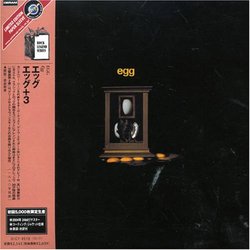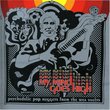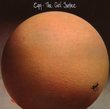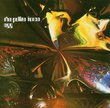| All Artists: Egg Title: Egg Members Wishing: 4 Total Copies: 0 Label: Universal Original Release Date: 1/1/2005 Re-Release Date: 1/17/2005 Album Type: Extra tracks, Import Genre: Rock Styles: Progressive, Progressive Rock Number of Discs: 1 SwapaCD Credits: 1 |
Search - Egg :: Egg
 | Egg Egg Genre: Rock
Japanese reissue of 1970 debut album, originally issued on Deram, is packaged in a limited edition miniature LP sleeve & includes two bonus tracks, 'Seven Is A Jolly Good Time' & 'You Are All Princes'. Universal. ... more » |
Larger Image |
CD DetailsSynopsis
Album Description Japanese reissue of 1970 debut album, originally issued on Deram, is packaged in a limited edition miniature LP sleeve & includes two bonus tracks, 'Seven Is A Jolly Good Time' & 'You Are All Princes'. Universal. 2005. Similar CDs
|
CD ReviewsThat Other keyboard-led British prog trio William Scalzo | Niagara Falls, NY | 10/01/2005 (4 out of 5 stars) "Aside from my obsession with Soft Machine, I'm usually more of a symph-prog fan than a Canterbury fan. Egg came out of the Canterbury scene and had the typical jazz overtones and humorous, self-referential lyrics. But this band had plenty of symph-prog about them as well. Egg had the same line-up as ELP, led by Hammond master Dave Stewart who was at least the equal of, if not better than Keith Emerson. And while Mont Campbell had a deeper voice than Greg Lake's, he too had that choirboy quality that made a line like "why don't you all go to hell" sound like he was inviting you to tea. This band had the prog-rock pretention down in spades too, having the cheek to title a sidelong epic "Symphony #2" on this their FIRST album! This CD features some absolutely phenomenal playing, and hardcore prog fans should give it a try. Keyboards fanatics should absolutely pick it up. Vocals are sparse and the long, inventive instrumental sections really suck you in and get you caught up in the classic prog jamming. For such "deep" prog, Egg manages to come up with tons of catchy riffs that are as addictive as pop music. Stewart was really a master of coming up with riffs that were both artistically pleasing and catchy and entertaining. The truly amazing thing about this 1970 debut is that the band members were all only about 20 years old at the time and had this amount of talent! This CD features a segment of the "Symphony" that did not appear on the old vinyl album due to copyright issues with the estate of Stravinsky, who's music is quoted in the third movement. This CD also includes both the A and B sides of the band's one and only single, and for once I'm happy to report bonus tracks that are actually bonuses! "7 Is A Jolly Good Time" in particular is a classic, with cleverly constructed lyrics about the joys of playing music in offbeat time signatures that makes it a song that any prog fan with a sense of humor should hear at least once. Recommended for hard core prog fans, keyboard maniacs, Soft Machine and Canterbury fans." An experimental, keyboard-led prog trio Jeffrey J.Park | Massachusetts, USA | 07/29/2006 (5 out of 5 stars) "Released in 1970, this debut album by British band Egg is extremely complex progressive rock that is dominated by some incredible Hammond organ work. I guess that it is worth noting that although this keyboard-led trio is considered part of the "Canterbury' scene, the music sounds nothing like Caravan or Hatfield and the North (although the Canterbury sense of humor is present). Rather, the music of Egg combines a significant proportion of avant-garde tendencies with classical and some dissonant passages. In general though, over-the-top technical excess is the order of the day and I absolutely love it. The musicians on this album include keyboardist extraordinaire Dave Stewart (Hammond organ, acoustic piano, mellotron, and tone generator - it's a crude synthesizer); Mont Campbell (vocals, bass guitar); and Clive Brooks (drums). All of these guys are simply phenomenal musicians and the individual and ensemble playing is simply out of this world. With respect to the bass player, Mont Campbell does not simply follow the left hand piano part but is thoroughly contrapuntal, which makes an Egg composition very interesting. Although Mont's vocal abilities are not great and sound a tiny bit dated at times, the vocals are not a big part of the Egg sound and do not detract from anything at all. The tracks on the album range in length from the 0'09" experimental track Bulb to the excellent 25+ minute multi-movement Symphony No. 2. In general, the music on the album mixes experimental passages with some very nice adaptations of classical pieces (J.S. Bach's Toccata and Fugue in D-minor along with Grieg's Hall of the Mountain King), incredible jamming, and quirky proggy tracks with vocals (While Growing my Hair, I will be Absorbed, and The Song of McGillicudie the Pusillanimous). In large part though, the tracks are mostly instrumental and are dominated by Dave's incredible Hammond organ playing. Although this album is simply amazing and very enjoyable, there are moments when the avant-garde tendencies can get mildly irritating, but do little to affect the overall listening experience. This becomes apparent on "They laughed when I sat down at the Piano", which features a very nice classical piano piece that is countered with some abrasive noises on the tone generator - it's actually kind of funny really. There is also the tone generator "freak-out" on Symphony No. 2 during the Blane movement that gets a little nerve-wracking. Odd time signatures abound and meters such as 5/8, 7/4, 9/4, 9/8, and 13/8 are used along with frequent meter shifts. Chord structures are also pretty exotic and there are some very unusual root movements. This remastered version by Eclectic discs is very good and features a ton of liner notes along with restored cover art and pictures of the band. Sound quality is also excellent. One of the features of this version of the album that is pretty cool is the addition of a previously unreleased fourth movement of Symphony No. 2. The additional tracks include Seven is a Jolly Good Time, which celebrates the jolly delights (or horrors, depending on your perspective) of playing in 7/4, along with "You are all Princes" (which ends abruptly). Both tracks were released as singles in 1969 and are pretty good. There are tiny bits of psychedelic influences on the two tracks. All in all, this is excellent stuff that is highly recommended along with the superb follow up album Polite Force (1971)." Egg - 4 stars Warren W. Nelson | Mooresville, NC USA | 09/07/2005 (4 out of 5 stars) ""The music on this LP(cd) is not dancing music, but basically music for listening to. It is harmonically and rhythmically complex, designed to be as original as possible within the confines of the instrumental line-up; so it's pretty demanding on the listener's attention" begins the liner notes to this superb example of canterbury progressive album. Egg were a keyboard, bass, and drum outfit who were all excellant musicians especially keyboardist Dave Stewart who understood the concept of melody and improvisation inside the wonderful tone of his various keyboards. This is their intelligent and critically regarded debut which some have described as a cross between canterbury and rio which may be interpreted to mean melodically sophisticated to abstract progressive rock performed with great wit and artistic dedication. This is a great cd. also check out their even better follow up 'The Polite Force'"
|

 Track Listings (14) - Disc #1
Track Listings (14) - Disc #1


